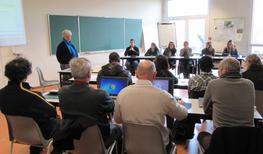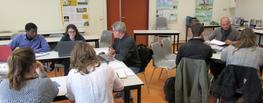Designing new crops for the future
Worldwide evolutions of Agriculture (environmental and societal changes) raise issues on paradigm shift in plant breeding and plant protection. We propose students (at the M1 level) to imagine cultivated varieties for tomorrow, new plant protection strategies and their implementation within production chains. This teaching module lays foundation of plant sciences applied to agrosystems management and mobilizes MSc skills within an applied multidisciplinary context.
Objectives of this module
- Provide disciplinary knowledge, methods, competences and know-how, to think about global scale evolution in varietal innovations and crop protection
- Learn how to conceive new plant models and protection systems in line with natural resource management, integrated within innovative or traditional cropping systems
- Acquire new operational skills and discover scientific executive careers in plant breeding and plant protection sectors
This module is will be taught in English. Thus, a B1 CECRL level in English is a prerequisite.
Organization
- One item per week
- A four-weeks applied transversal project (on a specific crop or cropping system, declining each item)
- Visit to a seed company
Four items
- Analyze and predict the effect of global changes on cropping systems (climatic changes, societal expectations, pests, food security, diversification of agricultural production)
- Define crop ideal-type adapted to environmental constraints and innovative cropping systems (ideotypes, biocontrol, resistance, tolerance, genotype/environment interaction)
- Methods to reach this ideal-type (genetic innovations, plant-pest-natural enemy interactions, link between genotype and phenotype, control of genetic recombination)
- Technical, societal and legislative challenges (perception towards innovation, public acceptability, mode of production, participatory selection, legal challenges)
This module is included into a « plant science » track in Montpellier SupAgro, open to academic exchanges.
Contribution of CultiVar within this module
An initiation to project-based learning and a detailed pedagogic scenario will be provided to the tutors.
Next session : in February 2020
The module is coordinated by Florian Fort and Dominique This helped by Isabel Martin Grande. The major tutors in 2018-2019 are from unit AGAP, Franck Curk (team SEAPAG) about citrus and Abdoul Aziz Saïdou (team DDSE) about sorghum, from unit CEFE, Thierry Winkel about quinoa and from EBCL lab, Gaylord Desurmont, about biological control and Marie-Claude Bon, about Trissolcus japonicus.


